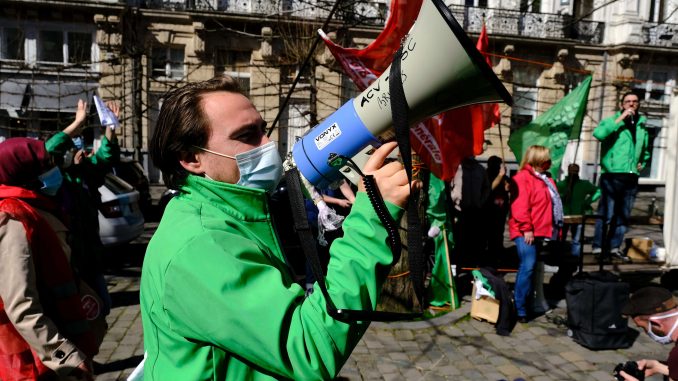
[ad_1]
Workers at British Columbia’s only wholesaler and distributor of regulated cannabis products went on strike this week, leaving the province’s legal pot shops scrambling to ensure they have enough product to keep their doors open. Workers with the British Columbia General Employees’ Union (BCGEU), which represents about 33,000 service industry employees, set up picket lines at four distribution centers operated by the BC Liquor Distribution Branch (BCLDB) on Monday in an effort to gain higher wages from their employer.
On Wednesday, the BCLDB announced that because of the labor action, the cannabis distribution centers will be temporarily unable to accept or fill orders, process invoices or ship merchandise to the province’s licensed retailers.
“We sincerely apologize for this disruption and for the impact to your business,” the distributor wrote in a statement to stores published on its website.
Provincial officials have been working on a plan to allow cannabis retailers to accept deliveries directly from licensed producers. But until the plan goes into effect, the BCLBD is the only wholesaler and distributor for the province’s weed dispensaries.
“The BC Liquor Distribution Branch recognizes the current job action being taken by the BC General Employee’s Union may be concerning to wholesale and retail customers,” the distributor in a statement quoted by the CBC, adding that the B.C. Cannabis Store website is also unable to fill or deliver customer orders.
“We do not know the extent of any future job action and therefore cannot speculate on the inventory levels held by wholesale customers nor customer demand and buying behaviours in this dynamic environment,” the distributor added.
Strike Could Lead to Shortages and Store Closures
Cannabis retailers in British Columbia are left to speculate on the effect the distribution center strike will have on their businesses. Omar Khan, the senior vice president of corporate and public affairs for High Tide, said that the company’s chain of Canna Cabana stores faces impending shortages if the strike does not end quickly, adding that it could have long-standing implications for the regulated cannabis industry.
“For the time being, we are managing the situation by reallocating inventory between our British Columbia stores, but if the job action is not resolved within the next 10 days, we could face inventory issues,” said Khan. “We urge the BCLDB and the BCGEU to resolve their dispute as soon as possible, as lack of inventory at licensed cannabis stores risks driving consumers back into the hands of the illicit market, which will endanger public health and drive much-needed revenue away from government coffers.”
Other retailers are worried that the strike will force them to close their stores until the labor dispute is resolved.
“If it lasts more than two weeks, then we are probably looking at closing down the store because there is nothing to sell,” said Jacob Michalow, the assistant general manager at Marigolds Cannabis in Vancouver.
Vikram Sachdeva estimated that his chain of Seed and Stone stores currently has an adequate supply of products, but said that the situation could change in the event of an extended strike.
“I’m hoping that we can survive for a week or a little bit longer, but beyond that point, it’s going to be very difficult,” said Sachdeva, adding that he wished that retailers were given more notice of the labor action.
“It just came as a bit of a shock, and … now the concern is how long before they start delivering to us so that we don’t start running out of products?” he said.
Sachdeva said that he is worried he will have to turn customers away if he runs out of product and fears that medical marijuana patients will have difficulties accessing their medicine. He also expressed concerns that customers who are disappointed by a lack of regulated cannabis will turn to the illicit market instead.
Jaclyn Pehota, the executive director of the Association of Canadian Cannabis Retailers, noted that bars and restaurants are able to better cope with the strike because they can also buy products from private wineries and craft breweries if they are unable to receive goods from the distribution centers.
“That is something that we’re calling on government to explore,” said Pehota. “We would like the same diversity of supply chain for cannabis retail.”
David Hurford, secretary of the B.C. Farmers Craft Co-op, agreed, saying that many consumers in the province are able to find illicit sources of cannabis if licensed dispensaries run out of merchandise.
“We completely respect the union’s right to take this action, but it is up to the government to have a contingency plan in place,” Hurford said.
[ad_2]
Source link

Soyez le premier à commenter